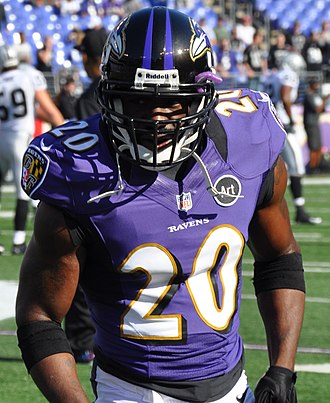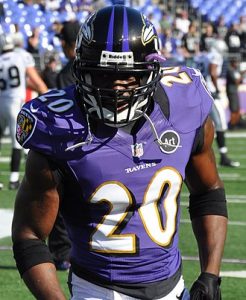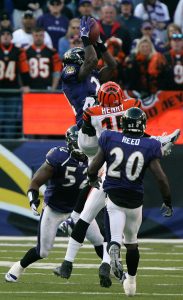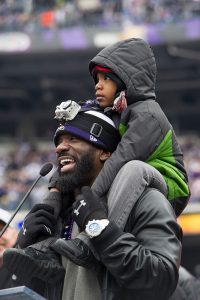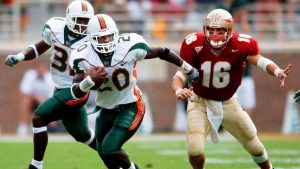During the AFC Championship game between the Baltimore Ravens and New England Patriots in 2011, television cameras zoomed in on the play-call wrist band Tom Brady was wearing on his left hand. And written on it in magic marker, presumably by the quarterback himself, were these words:
No. 20 for the Baltimore Ravens was Ed Reed. And the place he can be found for decades to come is the Pro Football Hall of Fame where his bust will become a permanent resident this fall.
Reed, the former University of Miami standout who was part of the 2001 national title team, was among five modern era enshrinees elected into the Hall of Fame Saturday afternoon.
He along with tight end Tony Gonzalez and cornerback Champ Bailey were selected as first-ballot Hall of Famers.
Cornerback Ty Law and center Kevin Mawae also were selected to join the 2019 Hall of Fame class as modern era inductees.
Safety Johnny Robinson, who played from 1960-1971, was selected as a seniors inductee while Denver Broncos owner Pat Bowlen and former Dallas Cowboys personnel man and current NFL.com contributor Gil Brandt were selected as contributors.
Although Reed get a trip to Canton, Ohio, where the Hall is headquartered, the news was not so favorable for other finalists with South Florida ties.
Receiver Isaac Bruce, who played at Fort Lauderdale Dillard High before becoming a star with the Rams and later San Francisco 49ers, was eliminated in the cut from 15 modern era finalists to 10.
Former University of Miami running back Edgerrin James, who played on the same Hurricanes team in 1998 with Reed, survived the cut to 10 finalists but was among the five eliminated in the final cut to five.
That doesn’t diminish what James or Bruce accomplished during their NFL careers. They were both great and I believe both will someday be in the Hall of Fame.
But the Reed selection was simply a no-brainer.
Indeed, the presentation speech, which is unofficially limited to five minutes during which time the presenter tries to convince the other 47 selectors to vote for his or her finalist, took only about two minutes.
And there was zero debate about Reed afterward.
There certainly was zero debate about how great Reed was when he was playing.
“He’s the best weak safety I’ve seen since I’ve been in the National Football League in my career,” New England Patriots coach Belichick once said of Reed. “He’s outstanding at pretty much everything.
“The list goes on and on with him. It’s just a question of pretty much anything he’s out there for, he’s good at.”
During a behind-the-scenes look at the Patriots years ago, cameras captured Belichick and Tom Brady going over the Baltimore defense when the subject of Reed came up.
“Every time you break the huddle, that’s who you’re looking at,” Brady told his coach.
It was hard not to notice Reed because he didn’t just play the position better than anyone else, he came up with look-at-me plays that simply stunned opponents.
In 2004, Reed broke the NFL record when he returned an interception 106 yards.
He broke that record, his own record, in 2008 when he returned an interception 107 yards.
Reed finished his amazing 12-year career with 64 interceptions, which is seventh all-time. His nine postseason interceptions is tied for the NFL record and that’s one more than the top six all-time interception leaders combined.
He led the league in interceptions three times (which tied an NFL record) and was in the top 10 seven times. His 1,590 interception return yards is a record. His nine postseason interception is tied for the NFL record.
Reed was named to the Pro Bowl nine times and was an All-Pro five times. And where did the motivation for that come from?
“I was playing for my parents, who provided for five kids in a one-bedroom apartment,” Reed said. “That was on my back. Hall of Fame stuff, that’s for them. That’s about my people who helped me get to where I’m at.”
MORE ON ED REED
Edward Earl Reed Jr. is a former American football safety who spent the majority of his career with the Baltimore Ravens of the National Football League (NFL). He played college football for the University of Miami, where he was a two-time consensus All-American. He was drafted by the Ravens in the first round of the 2002 NFL Draft and played eleven seasons for Baltimore before playing with the Houston Texans and New York Jets in 2013.
During his playing career, Reed was selected to nine total Pro Bowls, was the 2004 NFL Defensive Player of the Year Award winner, and has an NFL record for the two longest interception returns (106 yards in 2004 and 107 yards in 2008). He also holds the all-time NFL record for interception return yards, with 1,590, and postseason interceptions (9, tied with three other players). His 64 regular season interceptions ranked him 6th on the NFL’s all-time leader list at the time of his retirement. Reed is considered to be one of the greatest safeties in NFL history, and was often referred to as a “ball hawk” during his prime. Reed was known for studying film to memorize opposing teams’ tendencies, as well as his ability to lure quarterbacks into throwing interceptions.
In addition to football, Reed was a standout track athlete at Destrehan High School. He was a member of the state champion 4 × 100 meters relay squad. He set a high school record throw of 56.94 meters in the javelin throw. Also a standout long jumper, he recorded a personal-best leap of 7.20 meters.
While in college, Reed joined the Miami Hurricanes track and field team in 2000, where he competed as a jumper and javelin thrower. He placed 7th in the triple jump at the 2000 Big East Championships, setting a career-best jump of 14.58 meters. In addition, he finished 3rd in the javelin throw, with a personal-best throw of 60.08 meters.
Reed received an athletic scholarship to attend the University of Miami, where he was a standout defensive back for coach Butch Davis and coach Larry Coker‘s Miami Hurricanes football teams from 1997 to 2001. He played for the Hurricanes team that won the 2001 National Championship.
After redshirting in the 1997 season, Reed led the team with two interceptions and four forced fumbles in the 1998 season. He had two more interceptions in the 1999 season. Reed was recognized as a consensus first-team All-American in the 2000 season, and a unanimous first-team All-American in the 2001 season. In 2001, he led the nation with nine interceptions for 209 yards, which was a school record, and three touchdowns. He helped seal a memorable win over Boston College in 2001 when he grabbed the ball out of teammate Matt Walters’s hands, who had just intercepted it, and raced 80 yards for a touchdown. Reed was honored as the Big East Defensive Player of the Year in 2001, and was named National Defensive Player of the Year by Football News. He was a finalist for the Jim Thorpe Award and was a semifinalists for the Bronko Nagurski Trophy.
Reed set several records during his time at the University of Miami. He holds the record for career interceptions with 21, career interception return yards with 389, and interceptions returned for touchdowns with five. He also blocked four punts during his four-year career. In addition, he was a member of the track and field team during his years at Miami and was a Big East champion in the javelin.
Reed and Indianapolis Colts wide receiver Reggie Wayne were roommates during their time at the University of Miami. He graduated in 2001 with a bachelor’s degree in liberal arts. Reed was inducted into the University of Miami Sports Hall of Fame as part of its Class of 2012 at a banquet held in Miami on March 29, 2012.
Reed was inducted into the College Football Hall of Fame on January 7th, 2018.
NFL records
- Tied-most playoff career interceptions (9)
- Longest Interception Return (107 yards) *Touchdown
- Most interception return yards, career (1,590 yards)
- Tied-most career blocked punts returned for touchdowns (3)
- First person in NFL history to return an interception, punt, blocked punt, and fumble for a touchdown
- Most multi-interception games, career (12)
Ravens franchise records
- Most career interceptions (61)
- Most career interception return yards (1,541)
- Most career interception return touchdowns (7)
- Most passes defended (137)
- Most interception-return yards in a single game (150)
